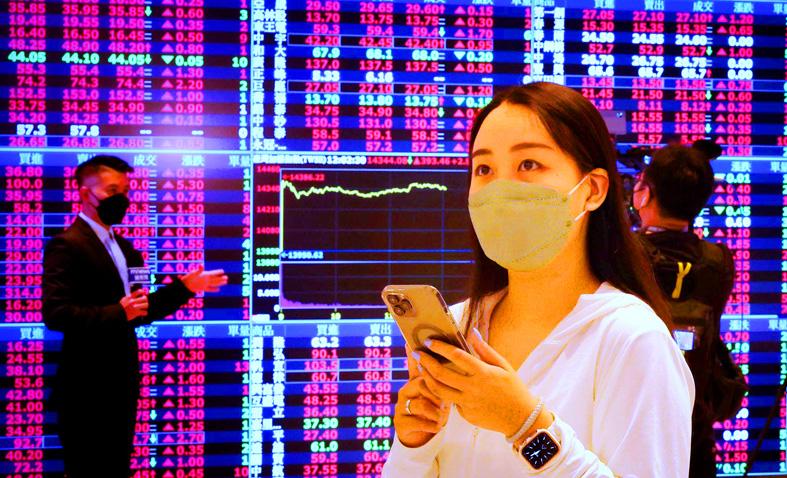Rules on collateral for stock traders would be eased, the Financial Supervisory Commission (FSC) said yesterday, as it seeks to reduce financial pressure on investors amid volatility on the local stock market.
The announcement of the second relaxation of the rules since the second quarter of 2020 came after the government activated the NT$500 billion National Stabilization Fund on Tuesday to support the local stock market.
When getting a margin call, investors were previously required to deposit cash or securities as collateral to prevent brokerage companies from closing out their portfolio positions.

Photo: CNA
The commission said investors can now also use assets other than cash or securities as collateral, including gold and real estate.
Newly allowed assets must be liquidity similar to the previously required assets, the commission said.
It is further required that their value can be objectively assessed and the brokerages involved must agree to their use, it added.
“For example, mutual funds can be the sources of collateral as well,” Securities and Futures Bureau Deputy Director Kao Ching-ping (高晶萍) told the Taipei Times by telephone.
Investors receive margin calls when their collateral to loan ratio falls below the maintenance requirement ratio of 130 percent. The commission did not adjust this requirement.
As the value of securities used as collateral fluctuates on a daily basis, the collateral to loan ratio might change more frequently and more quickly amid a volatile market, the commission said.
Investors with a collateral to loan ratio of close to 130 percent might therefore receive margin calls more frequently, it said.
“We hope this relaxed measure can help reduce pressure on investors because we have seen local stocks fluctuate more greatly in recent sessions,” Kao said.
In 2020, the commission eased the rules on collateral for three months.
This time, the commission said that the measure would be phased out when the situation in the stock market allows that move.
The commission also encouraged listed companies to buy back shares, saying that it would help improve investors’ confidence in Taiwanese equities.
The TAIEX yesterday closed up 113.84 points, or 0.79 percent, at 14,438.52, recovering from earlier losses induced by the higher-than-expected US inflation data released overnight.
The bellwether electronics sector led the rebound as large-cap semiconductor stocks, in particular contract chipmaker Taiwan Semiconductor Manufacturing Co (台積電), bounced back from their opening lows, while the financial sector moved below its previous closing throughout the session.
Turnover totaled NT$208.999 billion (US$6.99 billion) on the main board, with foreign institutional investors buying a net NT$571 million of shares, Taiwan Stock Exchange data showed.
Additional reporting by CNA

COMPETITION: AMD, Intel and Qualcomm are unveiling new laptop and desktop parts in Las Vegas, arguing their technologies provide the best performance for AI workloads Advanced Micro Devices Inc (AMD), the second-biggest maker of computer processors, said its chips are to be used by Dell Technologies Inc for the first time in PCs sold to businesses. The chipmaker unveiled new processors it says would make AMD-based PCs the best at running artificial intelligence (AI) software. Dell has decided to use the chips in some of its computers aimed at business customers, AMD executives said at CES in Las Vegas on Monday. Dell’s embrace of AMD for corporate PCs — it already uses the chipmaker for consumer devices — is another blow for Intel Corp as the company

MediaTek Inc (聯發科) yesterday said it is teaming up with Nvidia Corp to develop a new chip for artificial intelligence (AI) supercomputers that uses architecture licensed from Arm Holdings PLC. The new product is targeting AI researchers, data scientists and students rather than the mass PC market, the company said. The announcement comes as MediaTek makes efforts to add AI capabilities to its Dimensity chips for smartphones and tablets, Genio family for the Internet of Things devices, Pentonic series of smart TVs, Kompanio line of Arm-based Chromebooks, along with the Dimensity auto platform for vehicles. MeidaTek, the world’s largest chip designer for smartphones

TECH PULL: Electronics heavyweights also attracted strong buying ahead of the CES, analysts said. Meanwhile, Asian markets were mixed amid Trump’s incoming presidency Taiwan Semiconductor Manufacturing Co (TSMC, 台積電) shares yesterday closed at a new high in the wake of a rally among tech stocks on Wall Street on Friday, moving the TAIEX sharply higher by more than 600 points. TSMC, the most heavily weighted stock in the TAIEX, rose 4.65 percent to close at a new high of NT$1,125, boosting its market value to NT$29.17 trillion (US$888 billion) and contributing about 400 points to the TAIEX’s rise. The TAIEX ended up 639.41 points, or 2.79 percent, at 23,547.71. Turnover totaled NT$406.478 billion, Taiwan Stock Exchange data showed. The surge in TSMC follows a positive performance

FUTURE TECH: Nvidia CEO Jensen Huang would give the keynote speech at this year’s Consumer Electronics Show, which is also expected to highlight autonomous vehicles Gadgets, robots and vehicles imbued with artificial intelligence (AI) would once again vie for attention at the Consumer Electronics Show (CES) this week, as vendors behind the scenes would seek ways to deal with tariffs threatened by US president-elect Donald Trump. The annual Consumer Electronics Show opens formally in Las Vegas tomorrow, but preceding days are packed with product announcements. AI would be a major theme of the show, along with autonomous vehicles ranging from tractors and boats to lawn mowers and golf club trollies. “Everybody is going to be talking about AI,” Creative Strategies Inc analyst Carolina Milanesi said. “From fridges to ovens